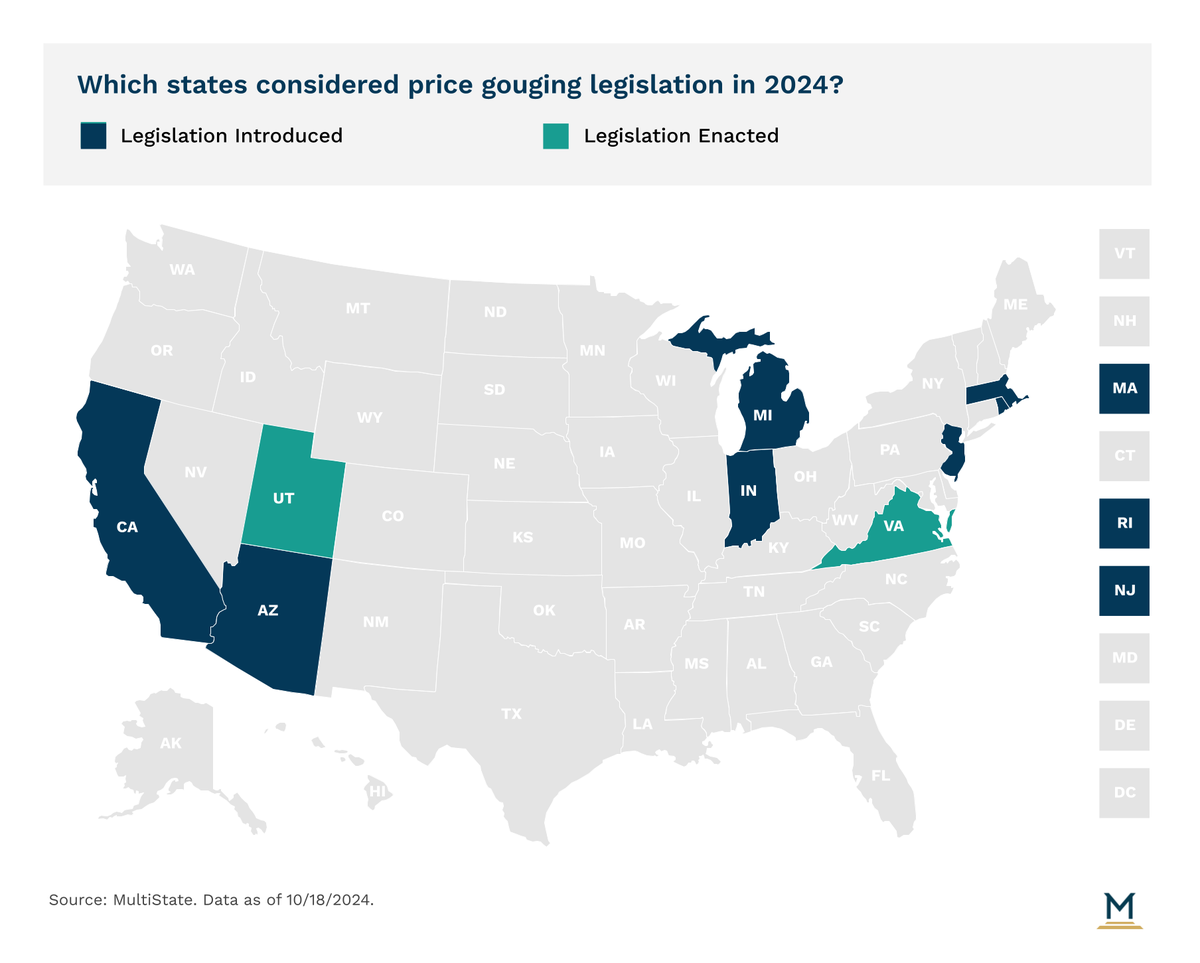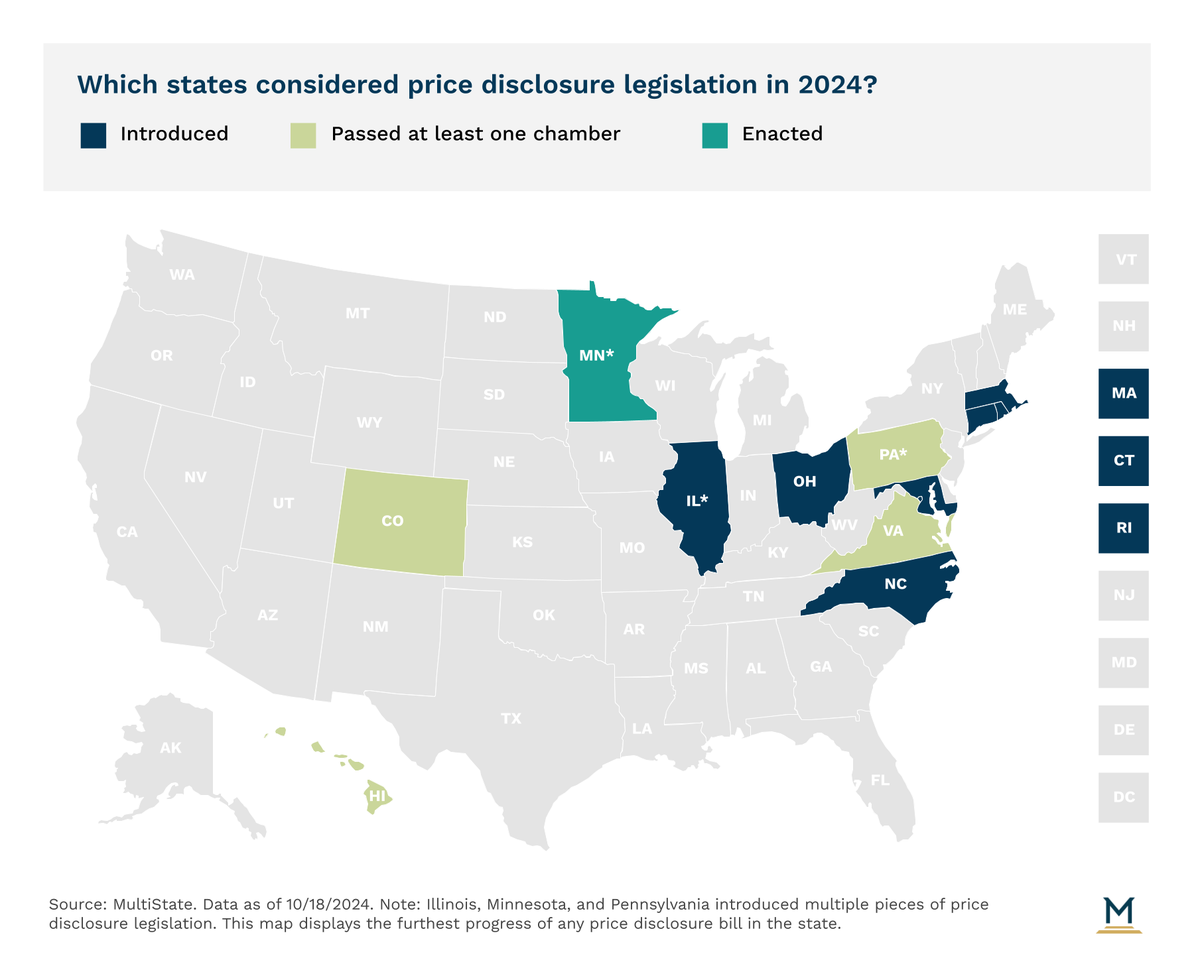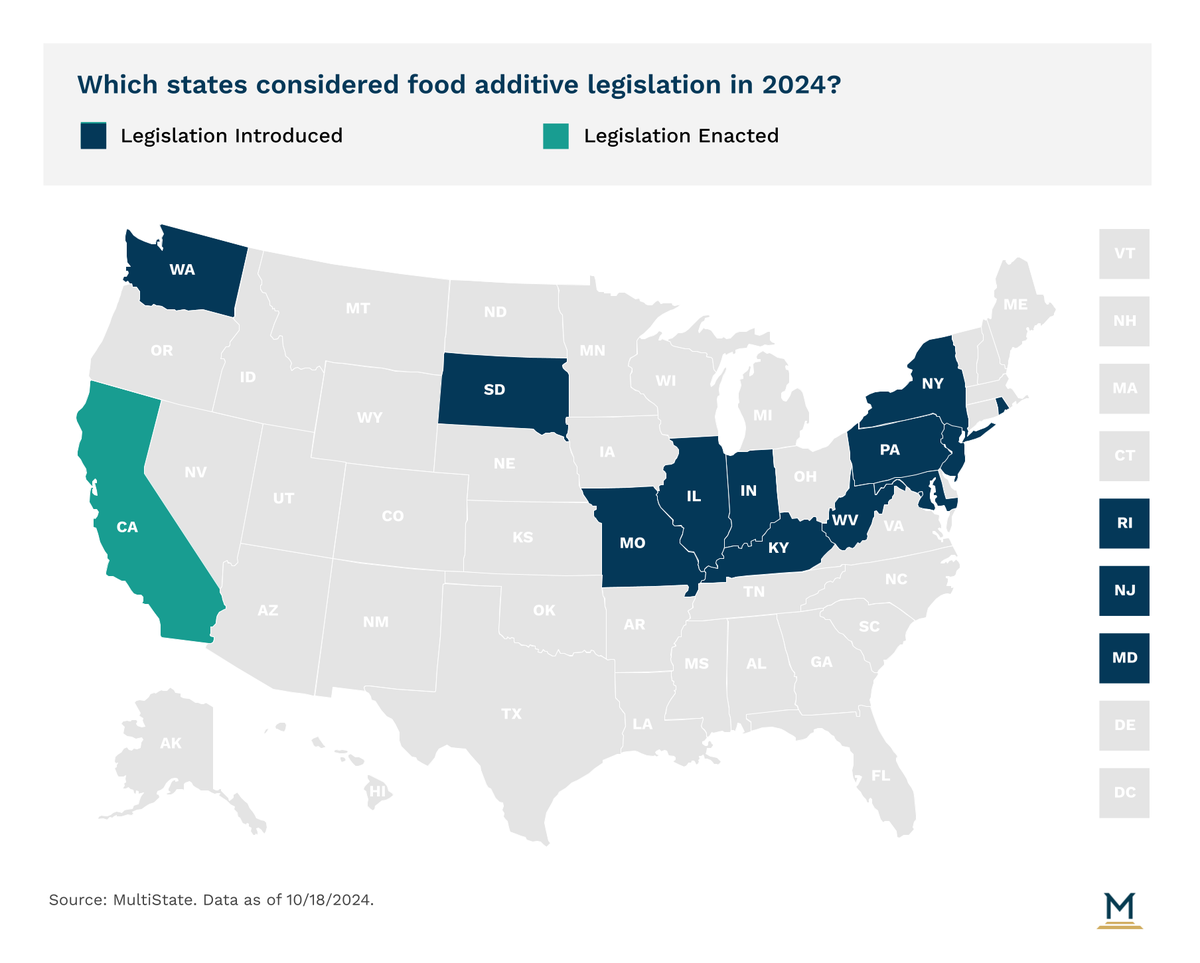
Financial Services & Commerce
Retailers Look to Policymakers to Navigate the Post-Penny Era
December 9, 2025 | Katherine Tschopp
February 7, 2025 | Katherine Tschopp

Key Takeaways:
Both state and federal legislators have targeted price gouging, minimum markup, and below-cost issues in price control legislation in the name of consumer protection as a result of residual economic consequences stemming from the COVID-19 pandemic. While price gouging has consistently been a prevalent pricing issue since then, in 2024, consumer protection legislation shifted from restricting exploitative to deceptive retail pricing behaviors. Price transparency emerged as a new trend as several states took legislative action to establish requirements for retailers regarding the need for the conspicuous disclosure of prices to consumers and consistency in pricing practices.
Virginia (VA HB 1301) and Utah (UT SB 73) enacted restrictions on price gouging during times of emergency; however, the majority of price gouging bills in 2024 began to steer away from state of emergency provisions and instead would have narrowed unconscionable pricing restrictions to sales of necessities like gasoline (MI HB 5897), infant formula and prescription drugs (MA HB 396 and RI HB 7160) regardless of whether there is a state of emergency.

Price gouging was not exclusive to the states as Congress introduced six bills in 2024 though progress beyond the initial bill introduction has been limited. Some bills (e.g., US S 3803) cover a broad scope and would prohibit overall price gouging. Other bills (US HR 8493) would establish a national price gouging task force. More often, though, Congress aligned with state efforts, addressing price gouging of natural gas after disasters (US HR 2596); gasoline (US S 355); and drugs and medications (US S 2044) demonstrating ongoing pricing concerns in critical areas like energy, transportation, and health care.
Minimum markup and below cost issues took the backburner as only Louisiana (LA SB 290), Nebraska 9NE LB 875), and Wisconsin (WI SB 988) introduced narrowly tailored, product-specific minimum markup and below cost bills in 2024. Nebraska and Wisconsin focused on alcoholic beverages, while Louisiana reintroduced a bill that would have restricted minimum markups on dairy products.
In 2023, three states introduced innovative price transparency measures. California enacted a new law (CA SB 478) making it a crime, beginning July 1, 2024, for any person or company to engage in specified false or misleading advertising that does not include all mandatory fees or charges other than taxes or fees imposed by a government on the transaction. Novel digital coupon legislation in New Jersey (NJ SB 3573) and New York (NY AB 6827) would have required retailers to honor online discounts in physical stores, but the legislation did not advance in either state. At the federal level, the Federal Trade Commission proposed the Trade Regulation Rule on Unfair or Deceptive Fees (16 CFR Part 464) in November 2023, which would prohibit unfair or deceptive practices relating to price transparency and disclosures. In 2024, 13 states took the baton and introduced legislation that would impose more transparent pricing strategies on retailers, including clearer disclosures of product and service prices and fees, as well as consistent pricing across various platforms.
Legislators in nine states introduced 18 broad price disclosure bills in 2024 that would require all sellers to display the full price of goods, including all taxes and fees, clearly and conspicuously to consumers prior to purchase. Under these proposals, non-compliance would be deemed an unfair trade violation. Bills in Colorado (CO HB 1151), Illinois (IL HB 4629), and Virginia (VA SB 388) progressed past their legislative chambers of origin, and in May, Minnesota Governor Tim Walz (D) signed a retail price disclosure bill (MN HF 3438) into law. Lawmakers in Illinois, Maryland, Minnesota, Pennsylvania, North Carolina, and Congress proposed legislation that would have mandated the disclosure of all fees for specific goods such as gasoline (MD SB 651/HB 882, PA HB 2488), first-purchase and resold tickets (IL SB 3678, NC SB 607, US HR 3950), and hotel purchases (MN HF 3438, US S 2498, US HR 6543).

Swipe fees or interchange fees, a percentage charge paid by merchants and retailers on each credit card transaction, including sales tax and tip, have recently come back into focus at the state level. In June, Governor Pritzker (D) enacted signed legislation (IL HB 4951) into law, making Illinois the first state to ban swipe fees on the sales tax portion of transactions. Connecticut, Georgia, Kansas, Massachusetts, Michigan, Mississippi, Missouri, New Jersey, New York, Pennsylvania, Tennessee, and Washington also proposed prohibitions on swipe fees in 2024.
With the rise of online platforms for deals and discounts, senior and low-income consumers — who sometimes lack the skills or access to necessary technology — may face difficulties accessing these offers, motivating states to institute price parity across internet and in-person purchases.
In 2024, legislators in the Democratic trifecta states of Illinois, Massachusetts, New Jersey, New York, Rhode Island, and Washington introduced eight digital coupon bills that would require retailers to offer physical coupons identical to those offered online. Lawmakers in Massachusetts and Washington proposed to require retailers to apply all available online and in-store coupons to consumer purchases. A bill in Washington (WA SB 6265) went even further and would have required retailers apply coupons offered through their electronic platforms, regardless of whether the customer is enrolled in the retailer’s electronic platform.
We anticipate the introduction of similar pricing legislation in the states in 2025, particularly where legislation was introduced but did not advance. Both red and blue states have initiated price transparency efforts, but we expect to see divergent policies shaped by partisan perspectives. Kamala Harris has pledged to implement the first federal ban on “price gouging” if she is elected. On the campaign trail, she has specifically highlighted her intention to protect consumers from increased grocery prices. Following the devastating impacts of Hurricane Helene and Hurricane Milton, Harris released a statement outlining the Biden Administration's commitment to closely investigate allegations of price gouging in affected areas. MultiState expects the attention Harris has brought to the issue of price gouging to spur both state and federal legislative action in 2025.
States continued to enact additional food labeling mandates and moved to ban food additives in 2024, inspired by activity in California in 2023. Food allergen labeling continued to be a prevalent food labeling issue in 2024 as Minnesota (MN SF 4500), Missouri (MO SB 1064), New York (NY AB 7494/SB 6820, NY AB 9951), Pennsylvania (PA HB 1869), and Rhode Island (RI HB 7325), proposed measures which would have required food retailers and food service establishments to label food products that contain major food allergens, including on menus.
Some states, like Alaska (AL HB 66), Hawaii (HI HB 2278/SB 2962, HI HB 2298/SB 2481), and Louisiana (LA SB 62), enacted laws requiring various products to contain geographic origin labels. Both Alaska and Louisiana’s laws require geographic origin labels on all seafood products. In addition, Louisiana also enacted LA SB 40, LA HB 429, LA HB 676, and LA HB 748 in 2024 overhauling the state’s seafood labeling, processing, distributing, and licensing laws in 2024.
A rising trend were bills to prohibit the manufacture, sale, or distribution of food containing specific ingredients, such as food additives. Twenty-seven bills restricting their use were introduced in 13 states in 2024, a marked increase compared to the four food additive bills introduced in the 2023 legislative session. The five main additives legislators prioritized removing from foods and beverages for consumption were:
Red Dye 3: preservative and color additive derived from petroleum used to make food and drinks cherry red.
Brominated Vegetable Oil: vegetable oil modified with bromine used to suspend mainly citrus flavoring in sodas and juices to prevent the flavoring from separating during shipping and storage.
Potassium Bromate: oxidizing agent used in baked goods.
Propylparaben: antimicrobial preservative used in packaged foods.
Titanium Dioxide: color additive used to enhance the white color or opacity of other colors of foods.
These states follow in California’s footsteps, as is often the case, the first state to ban the manufacture, sale, or distribution of food products containing red dye 3, brominated vegetable oil (BVO), potassium bromate, and propylparaben when Governor Newsom (D) signed CA AB 418 into law in 2023. In 2024, California followed by enacting CA AB 2316 prohibiting public and charter schools from offering, selling, or otherwise providing any food containing Blue 1, Blue 2, Green 3, Red 40, Yellow 5, and Yellow 6 dyes, and titanium dioxide. Progress in other states was limited in 2024 – only Il SB 2637 advanced beyond the initial introduction stage.

Like on many issues, states are more active in enacting new labeling mandates and additive bans than the federal government. Interstate outbreaks of listeria in deli meats and salmonella in eggs in 2024 may prompt federal intervention in 2025.
The labeling of food products, including their allergens and geographic origins, will remain a prevalent food issue in 2025 and we expect an increase in state bans on food additives. Increasing expert and consumer awareness of permitted additives may lead legislative efforts to expand to other hazardous risks to food, such as heavy metals. We will also be watching to see if other states introduce bills similar to Congress (US S 4303) and Maryland’s MD HB 97/SB 723, enacted into law to require baby food manufacturers to test for toxic heavy metals before packaging individual units for sale or distribution in the state.
MultiState’s team is actively identifying and tracking consumer issues so that businesses and organizations have the information they need to navigate and effectively engage. If your organization would like to further track these or other related issues, please contact us.

December 9, 2025 | Katherine Tschopp

August 7, 2025 | Katherine Tschopp

April 4, 2025 | Bill Kramer